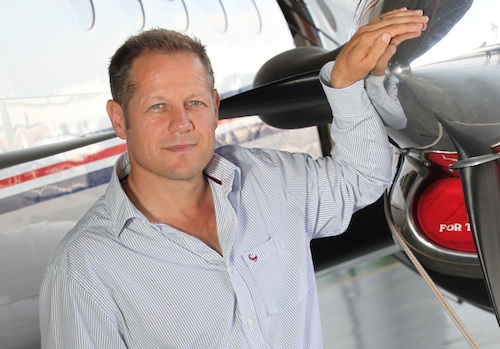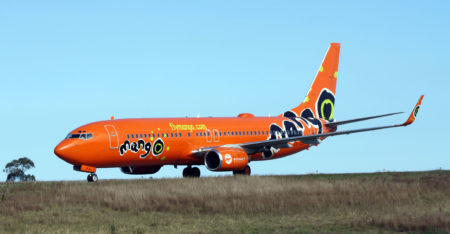
Wireless hotspot provider WirelessG has confirmed that low-cost airline Mango will be the first to offer Wi-Fi on its entire fleet of aircraft. The service will be available in the first quarter of next year and will cost users between R50 and R100 per flight. Final pricing is still to be determined.
Data usage will be uncapped and provided using satellite backhaul. Users can expect real-world download speeds in the region of 512kbit/s.
The necessary hardware is to be supplied by US hardware manufacturer Row 44. It will also provide the necessary quality assurance and oversee the installations. Local engineers will also receive training from Row 44.
WirelessG CEO Carel van der Merwe says all six of Mango’s aircraft will be fitted with Wi-Fi equipment. This will happen in January because there is a 14-week lead-time on production of the equipment, which is only made to order.
He says covering the entire fleet is the most pragmatic approach because although airlines have fixed routes and timetables they don’t always use the same aircraft for the same routes so it becomes difficult to offer guaranteed services on certain routes if it only kits out certain aircraft.
Van der Merwe says it will take six days per installation per plane because of the complexity of the installation and the extensive testing that is required. He says the cost of each installation is more than R4m and this does not include the cost of labour or the opportunity cost of having an aircraft out of commission while the work is being done.
WirelessG hasn’t said which company will supply the satellite backhaul, but promises it will announce this in coming weeks.
Van der Merwe says Wi-Fi is becoming more popular with airlines worldwide because “the power output to run it effectively is 20 times less than mobile GSM and the risk of interference from GSM is much higher”.
Although pricing plans haven’t been finalised, Van der Merwe says the company is considering allowing users to purchase connectivity for a portion rather than all of their flight. A pay-per-use model is also being mooted, where vouchers would be valid for 12 months.
There are concerns some people may use the service for Skype calls, disturbing other passengers. Van der Merwe says WirelessG has taken a “midway approach between customer demand and airline policies”. He says whether or not services like Skype will be allowed will be up to the airlines.
There will, however, be automatic blocks in place for things like adult content, because the airline can’t be sure who might be seated next to a passenger using the service.
Van der Merwe says WirelessG has had interest from two other airlines, but that “the barrier to entry for bigger airlines is larger capital expenditure”. He says WirelessG expects that eventually most airlines will be forced to offer the service.
“Wi-Fi won’t be a competitive differentiator but a competitive requirement,” he says, adding that mobile services could soon be coming to flights, too, using “femtocell” technology. Femtocells are small cellular base stations often used to boost connectivity in offices or shopping malls.
He says testing is ongoing in the US and Europe and the only reason it has taken so long is the requirements of the various aviation bodies are stringent and demand exhaustive testing. — Craig Wilson, TechCentral
- Subscribe to our free daily newsletter
- Follow us on Twitter or on Facebook
- Visit our sister website, SportsCentral (still in beta)


